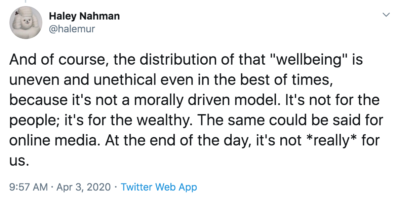
THE DEMOCRACY OF DIGITAL MEDIA
Media is in a really weird place right now. When cities locked down and everyone learned they’d be quarantined for an unforeseeable future, my boyfriend responded to my anxiety with a level of optimism I couldn’t bring myself to enjoy.
“Maybe you can sell some more articles,” he suggested. “People are going to have a lot of time to read.”
In fact, many of us do. I personally have read more articles in the past three weeks than I have in months. But despite an increase in online readership, a number of my freelance clients have morosely conveyed that they aren’t financially able to take on pitches from out-of-house writers. It left me staring up at my ceiling, and in the fashion of 4 Non Blondes saying, “What’s going on?” In fact, the plight of losing gigs is so real that freelancers are awaiting their own unemployment stimulus package. Budgets normally saved to hire freelancers are being cut or frozen, and even full-time writers and editors are included in the national slew of layoffs.
Media companies work differently than one might expect. There’s a lot of free content available out there, but that doesn’t mean that the company doesn’t turn a profit, that the writers, accountants, and marketing teams don’t earn paychecks that then pay their bills and feed their families. One of the most common ways for media companies to earn a paycheck is through advertisements and sponsorships.
But now we’re entering an era where brands, who pay for these ads and sponsored content on our favorite sites, are less inclined (scared) to spend money. COVID19 is seemingly particularly disruptive to an industry that’s dependent on funding from brands. Former Deputy Editor of Man Repeller Haley Nahman explains it well in an eloquent tweet thread, reminding us of the simple truth that the cost of creating content is dependent on advertisements.
Here’s how it often works: Readers go to their favorite websites for good stories, and the more traffic a website gets, the more money said website can charge a company to advertise on their pages. That’s one of the main ways a media company makes money. We also see this in some of our favorite blogs-turned-companies. In most cases, you’ll occasionally see a sponsored post with a disclaimer at the bottom, saying something like “I genuinely love this product as it helps support the site…” It doesn’t matter the blog’s niche, so long as they’re advertising something that falls in line with previously published content.
The same is true when working with larger publications with fleshed-out marketing, sales, and content teams. When I was an editor, I didn’t just look at a story and wonder what made it good: I deeply considered what led to increased KPIs (key performance indicators) and weighed whether or not it could help monetize the company. Many publications have tried to stray from “clickbait” and create more “authentic” content, but even then there’s a strategy behind it: Is the SEO relevant? Was the headline catchy? Will it adhere to my company’s voice as well as our brands?
For the record, I’m by no means criticizing this system: I have dedicated a lot of time and energy to finding the balance between meaningful and strategic storytelling. Some of my favorite publications create branded content that I one hundred percent love and support. In many scenarios, a media company or blog will work with brands that align with their mission, or strive to partner with brands they know their audience will enjoy. I think this is great.
If we’re solely creating content aimed to please a brand, our intention is not to share human truth, but rather to sell something.
Amanda Kohr
What I am saying is that we’ve created an editorial landscape where it’s hard for writers to earn a living without the support of big brands. I didn’t get into writing for the money. But being able to earn money from writing has made it so that I can dedicate more time to writing think pieces and op-eds, and less time to writing marketing copy. It’s important that our ideas are not created in a consumerist vacuum. Because if they are, are these stories really depicting what it means to be alive? If we’re solely creating content aimed to please a brand, our intention is not to share human truth, but rather to sell something.
I’m not proposing a definitive solution for this problem (I wish I could), but rather attempting to draw awareness to this very real plight. When we know that the media is struggling, we can sit and think about how we can best contribute to our favorite publications. In some cases, that means supporting their digital products. If there’s a subscription fee, pay it. Support a writer’s Patreon.
Two years ago, when I was pitching a story on the reality of dating a dad to On Our Moon founder Alex, I immediately recognized that she and I were aligned on one very important value: We wanted to tell real stories about what it really meant to be human. I think OOM can stick to this mission even if it does one day produce branded content, but it would certainly be difficult if that was the only source of revenue. It’s one of the reasons why OOM offers ticketed breathwork events. The attendees of the events, in a very real way, help fund OOM’s community of writers. That sort of creativity (and support) is what we need right now.
Share your favorite stories, via Twitter or TikTok or word of mouth. Engage. It pays off—I promise.







I work in content marketing and YES. This is something no one talks about or really understands and it’s so real. The scene has changed so much in the last 5+ years and no one has any idea how COVID will continue to shape it…
It kills me that more people aren’t talking about this. Reporters, essayists, and writers are crucial and yet so many of us have to turn to copywriting and ghostwriting in order to survive in a capitalist world.